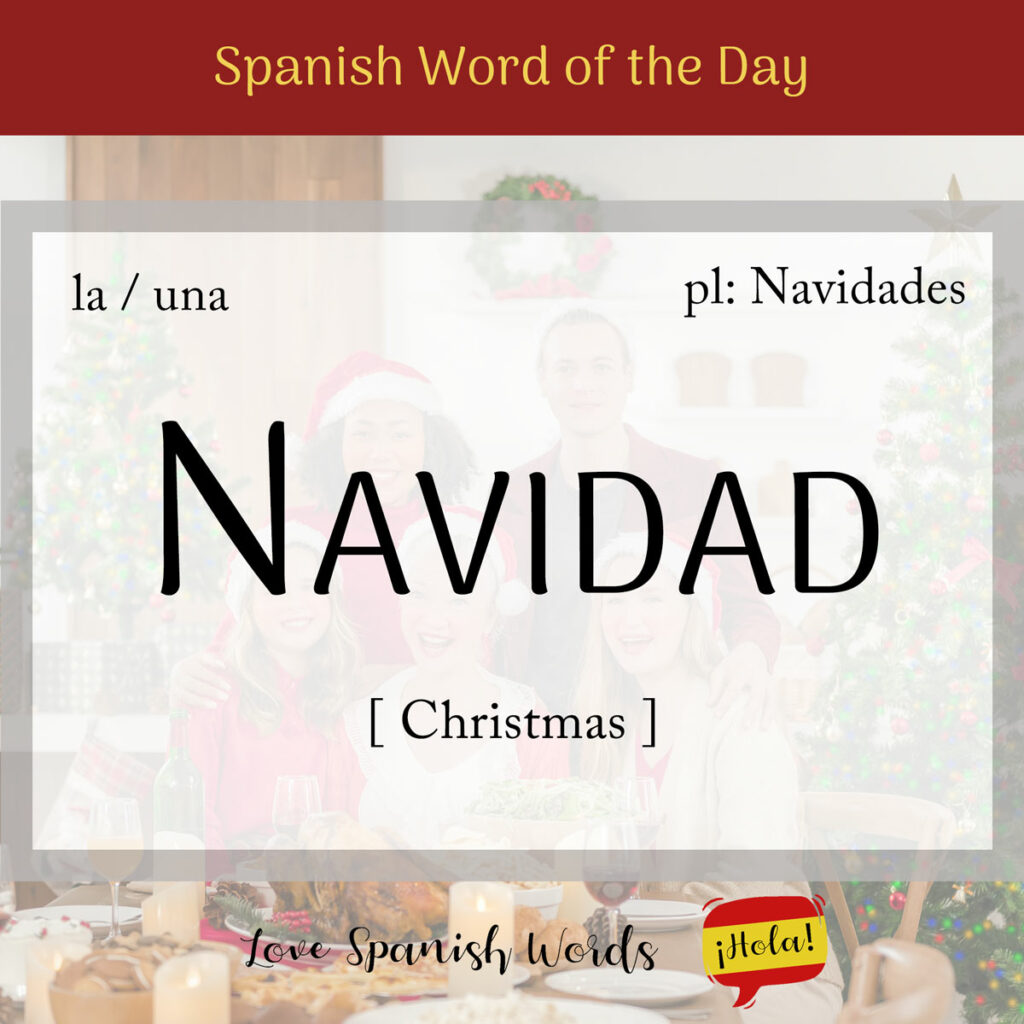The holidays are here and there’s no better time to discuss today’s word. Navidad originates from the Latin word nativitas, which means birth. In Spanish, nativitas evolved into Navidad, signifying the Nativity or the birth of Jesus Christ, traditionally celebrated on December 25. The root word nativus implies to be born and is the same root for words like natal in English (meaning relating to birth).
Latin American Pronunciation
European Pronunciation

Navidad is a feminine noun, so it uses feminine articles:
- La Navidad = The Christmas
- Las Navidades = The Christmases
- Una Navidad = A Christmas
- Unas Navidades = Some Christmases
Navidad specifically denotes the birth of Christ in Christian tradition, and it became synonymous with Christmas celebrations. As with many Romance languages, Spanish speakers adopted this term, and it retained its sacred association with Christ’s birth over time. However, Navidad in Spain and Latin America now encompasses more than just religious connotations—it’s a time for family gatherings, festive food, and holiday customs.
La Navidad es una época para compartir con la familia y los amigos.
Christmas is a time to share with family and friends.

Fun Fact:
José Feliciano’s Feliz Navidad song, written in 1970, is one of the most popular Christmas songs in the United States and Latin America, making Feliz Navidad a phrase universally recognised during the holidays.
Navidad, or Christmas, is celebrated with unique and vibrant traditions throughout the Hispanic world. For instance, in Mexico, la temporada navideña (the Christmas season) begins with Posadas, which run from December 16 to 24. These nine days represent Mary and Joseph’s journey to Belén (Bethlehem), and each night, families or neighborhoods gather to reenact their search for shelter. Processions, prayers, and caroling are followed by a lively gathering with food and festivities. It’s common to include Poinsettias, known as flores de Nochebuena (Christmas Eve flowers).
Similar to the posadas in Mexico, Colombians also hold the traditional Novena de Aguinaldos—nine nights of prayer and songs leading up to Christmas. Families and friends gather each night to rezar (pray), cantar villancicos (sing Christmas carols), and share traditional holiday treats. Another important celebration in Colombia is Día de las Velitas (Day of the Candles), celebrated on December 7 and marks the beginning of the Christmas season. Families and communities light candles and lanterns to honour the Virgen María (Virgin Mary), creating beautiful displays that fill streets, parks, and windows with light.
Tenemos que prepararnos para la novena esta Navidad.
We have to prepare for the novena this Christmas.
Maintaining the relationship between fire and Navidad, Guatemalans start the season with La Quema del Diablo (Burning of the Devil), also held on December 7, where effigies of the devil or household items are burned to rid homes of evil spirits. It’s a unique blend of folk tradition with Christian symbolism, preparing for a “clean” Christmas.
In Puerto Rico, Parrandas are very popular. Parrandas are lively gatherings where groups of friends surprise others by visiting their homes late at night, singing traditional songs, and playing instruments like guitarras (guitars) and maracas. The hosts then join the group to visit another friend’s home, creating a roving celebration. They also have Asaltos Navideños (Christmas Raids), these are more elaborate, surprise parrandas where friends bring food, drinks, and music to a friend’s home, making a party of it until dawn. The host is also expected to feed the group and join them for the next stop!
A mis abuelos les encantan los asaltos navideños.
My grandparents love Christmas raids.
Last but not least, on December 22, Spain hosts El Gordo (The Fat One), the world’s largest lottery. Drawn every year since 1812, this lottery has become a major tradition, with families and friends gathering to watch the drawing and hoping for a piece of the prize. In addition to this, the holiday season extends until January 6, known as El Día de Reyes (Three Kings Day or Epiphany), when children receive gifts brought by the Three Kings. Parades on January 5 welcome the arrival of the Kings, who often distribute sweets to children.
Across the Hispanic world, Navidad is marked by reuniones familiares (family gatherings), rituales religiosos (religious rituals), tradiciones culturales (cultural traditions) and a lot of food! Dishes vary by region but often include tamales, hallacas (Venezuelan cornmeal pies), lechón asado (roast pig), buñuelos (fried dough balls) and Natilla (custard-like dessert). On top of that, elaborate belenes (nativity scenes) are popular, often featuring extensive decorative displays with miniatures of the Sagrada Familia (Holy Family), animals, and angels.
¡Espero que ganemos El Gordo este año!
I hope we win El Gordo this year!

Fun Fact:
In much of the Hispanic world, Christmas celebrations are centered on December 24, known as Nochebuena (Christmas Eve), rather than December 25. Families gather for a festive dinner late in the evening, and many attend Misa del Gallo (Midnight Mass) after the meal, celebrating the birth of Jesus at midnight. Gifts are often exchanged after dinner or early Christmas morning, making Nochebuena the heart of Christmas festivities.
From its linguistic roots to its cultural manifestations, Navidad is a word that represents more than just a holiday—it’s a time to reconnect, reflect, and celebrate with loved ones. Whether you’re celebrating in Spain, Latin America, or elsewhere, ¡Feliz Navidad!

Spanish idioms featuring ‘Navidad’
Feliz Navidad
Literal translation: Happy Christmas.
English meaning: Merry Christmas.
Estar más solo que un pavo en Navidad
Literal translation: To be lonelier than a turkey at Christmas.
English meaning: To be very lonely.
Navidad, Navidad, dulce Navidad
Literal translation: Christmas, Christmas, sweet Christmas.
English meaning: Similar to “Jingle Bells, Jingle Bells” in terms of being a repetitive seasonal cheer.
¿Qué dijo? ¿Navidad?
Literal translation: What did you say? Christmas?
English meaning: Similar to “Did you think it was your lucky day?” It playfully pokes fun at someone’s misplaced optimism or mistaken expectations.

